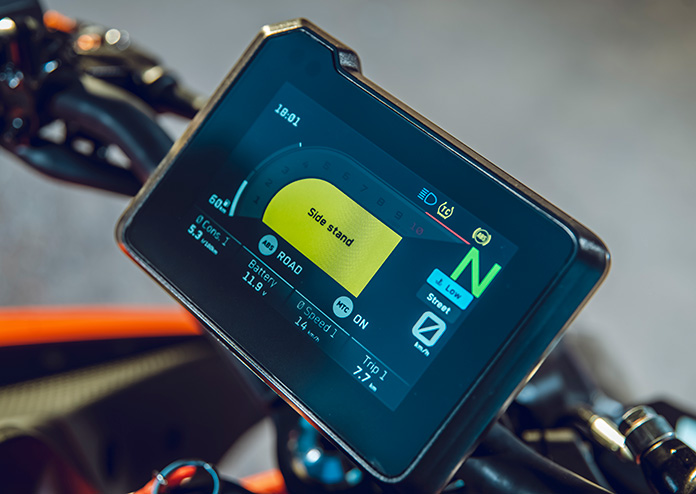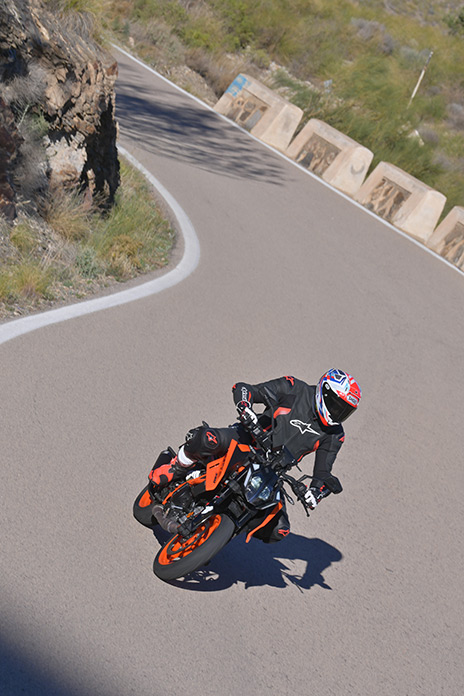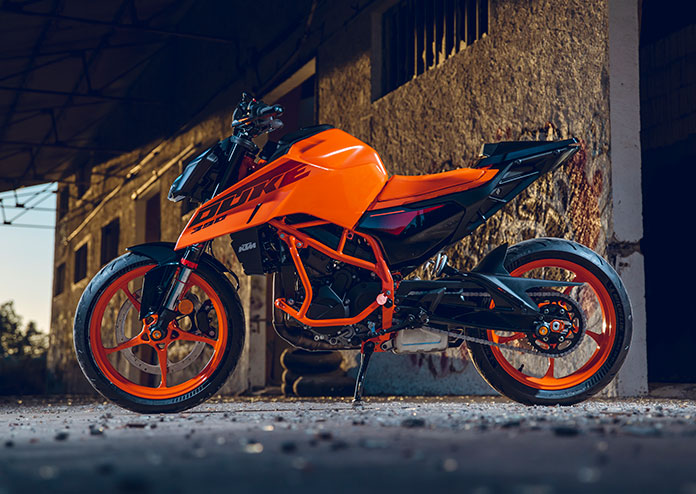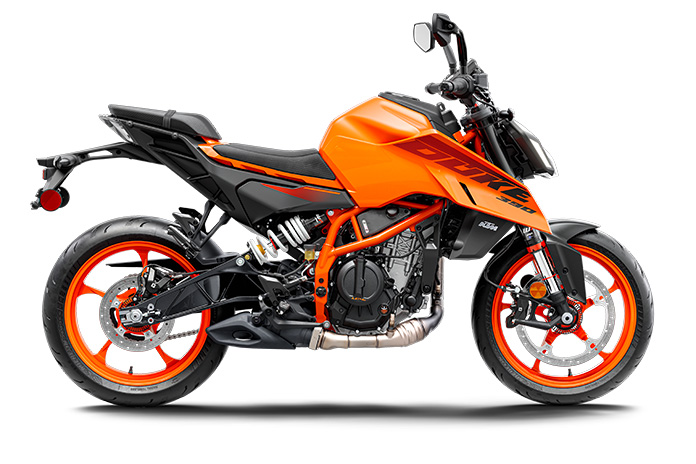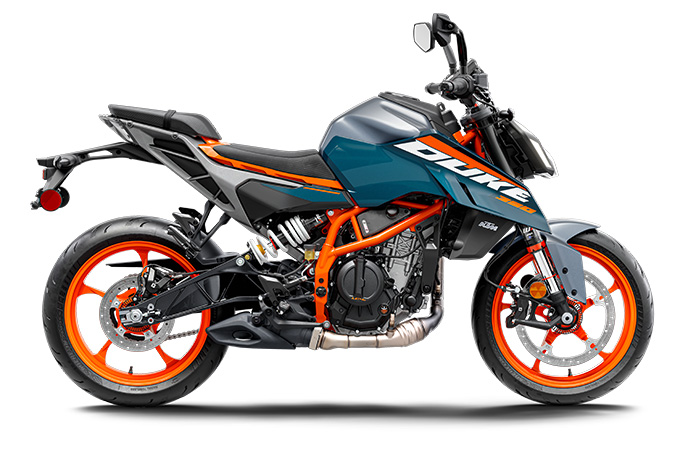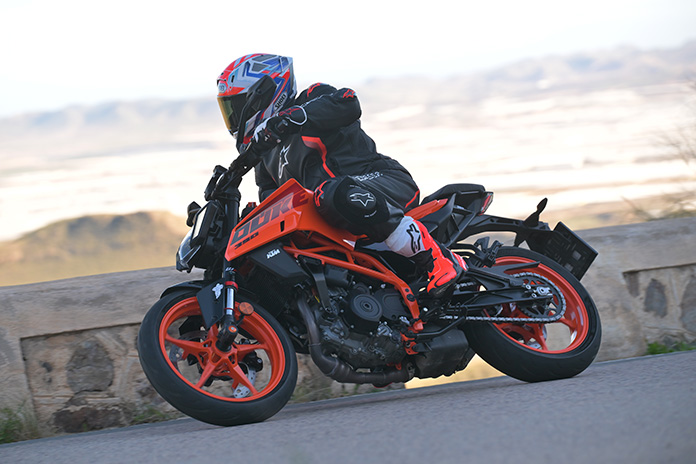
This is a year of milestones. The AMA is celebrating its 100th anniversary, Rider is celebrating its 50th, and KTM is celebrating “30 Years of Duke.” What started out as one bike in 1994 is now a seven-model lineup, including the 125 Duke, 250 Duke, 390 Duke, 790 Duke, 990 Duke, 1290 Super Duke GT, and 1390 Super Duke R Evo. We tested three new/updated models recently – the 390, 990, and 1390 – and we’ll start off with our KTM 390 Duke review.
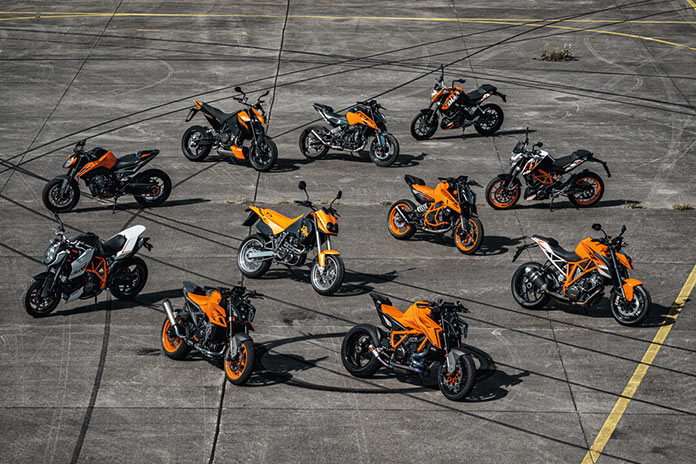
Thirty years ago, KTM – then a small Austrian manufacturer of dirtbikes – launched its first street-focused motorcycle, the Duke 620, a supermotard-style bike that was the brainchild of KTM engineer Wolfgang Felber. Starting with a KTM 620 R/XC dual-sport, which had a kickstart-only 602cc Single that made 56 hp, Felber shortened the suspension and gave it 17-inch spoked wheels shod with sticky street tires. Weighing just 315 lb, the flickable, wheelie-happy Duke – named after Geoff Duke, a British GP racer who won multiple world championships – became a cult favorite, a hooligan bike that encouraged a rowdy riding style.
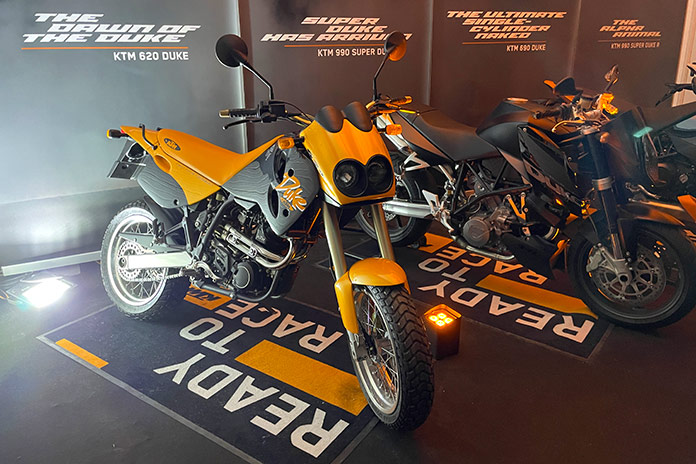
Today, KTM is the biggest brand in the Pierer Mobility empire – Europe’s largest motorcycle manufacturer that also includes Husqvarna, GasGas, and MV Agusta. Although the “Ready to Race” brand says it prefers to look ahead to the future than dwell on the past, KTM recently honored the Duke legacy by hosting a press launch in Almeria, Spain, for three new/updated models: the 390 Duke, 990 Duke, and 1390 Super Duke R Evo. The launch began with a half-day ride on the 390 Duke, which is the focus of this review.
Related: 2024 KTM 990 Duke Review | First Look
Related: 2024 KTM 1390 Super Duke R Evo Review | First Look
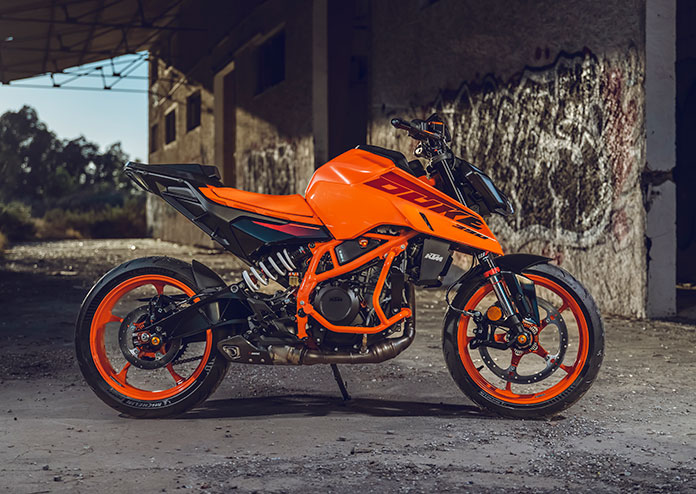
What’s New | 2024 KTM 390 Duke
Launched in Europe in 2013, the 390 Duke made its way to our shores in 2015 (read our road test review). Along with the 125 Duke and 250 Duke, the 390 Duke is made in India by Bajaj under the scrupulous supervision of KTM engineers. Just as KTM’s 790 Duke and 790 Adventure models are made in China by CFMOTO, these strategic partnerships allow KTM to increase its production capacity, keep a lid on ever-increasing labor costs, and gain in-country access to the two largest motorcycle markets in the world.
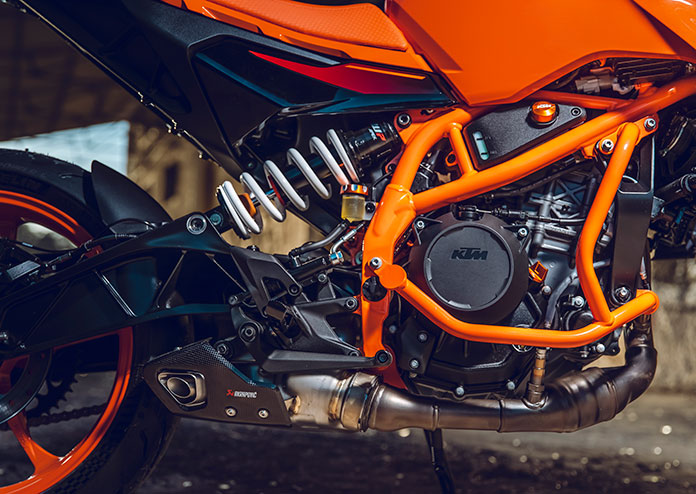
While the 390 Duke has evolved steadily over the years, the 2024 model represents a major leap forward. Compared to its predecessor, KTM says it is 90% new. Displacement of its liquid-cooled, single-cylinder engine has increased from 373cc to 399cc, contributing to a small increase in horsepower (45, up from 44) and torque (28.8 lb-ft, up from 27.3). The updated engine is lighter, has improved cooling yet also warms up faster, and has longer oil-change and valve-inspection service intervals. A larger airbox is located under the seat, and the fuel tank now holds 3.9 gallons, up from 3.6.
The 390’s tubular-steel trellis frame was made stiffer and now has an upper mount for the rear shock, which was moved from the center to the right side and positioned at a more horizontal angle, lowering the seat height from 32.7 to 32.3 inches. A new pressure die-cast aluminum subframe is also stiffer, and the new curved, open-lattice cast-aluminum swingarm has a lower mount on the right side for the shock and is curved to accommodate the tucked-in exhaust.
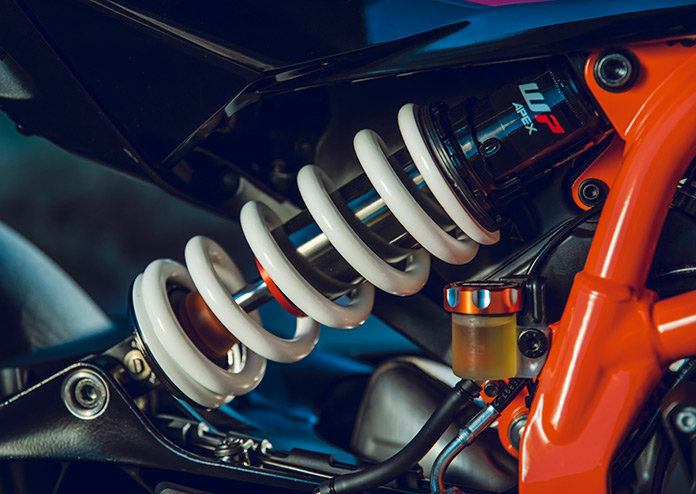
As before, the 390 Duke’s suspension is made by KTM-owned WP, but for 2024, it is upgraded to higher-spec Apex components. The 43mm inverted fork, held in place by new triple clamps, now offers rebound and compression adjustability with five-position clickers atop the fork caps. The Separate Piston rear shock has five-position rebound adjustability in addition to adjustable preload (both easily done with toolkit stored under the seat). Suspension travel has increased from 5.6 to 5.9 inches in the front and remains 5.9 inches out back.
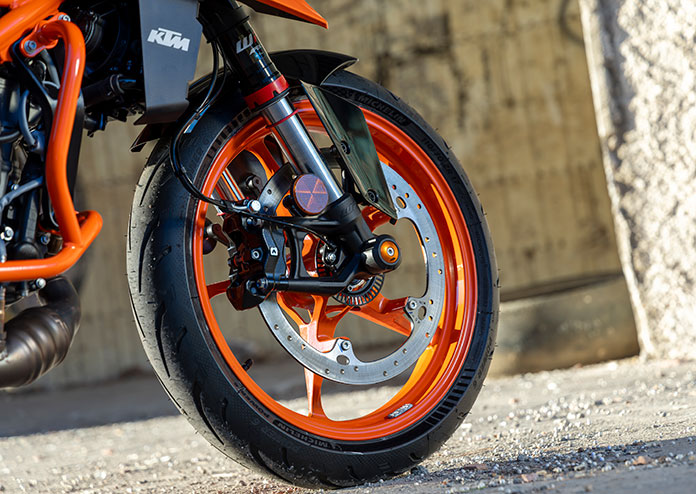
Revised 17-inch cast-aluminum wheels are shod with new Michelin Power 6 tires, and the combo sheds a remarkable 9.5 lb of unsprung weight. Claimed wet weight for the bike, however, remains the same at 364 lb. Single-disc brakes front and rear are made by Bybre, with a 4-piston radial front caliper pinching a 320mm disc (up from 300mm) and a 1-piston rear caliper with a 240mm disc (up from 230mm). ABS with a rear-off Supermoto mode is standard.
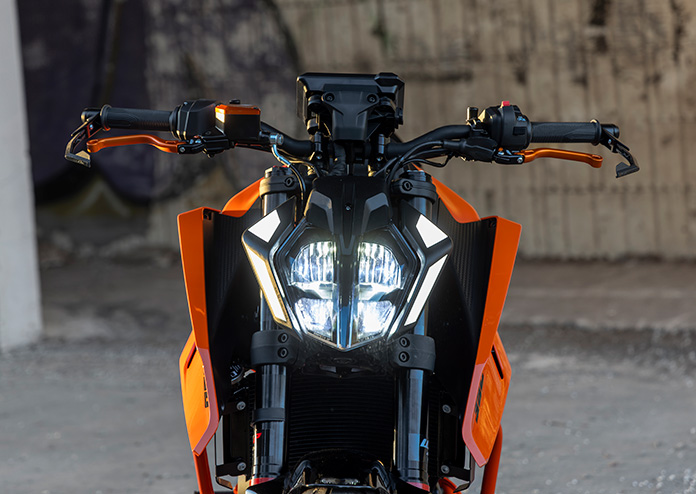
The 390 Duke has a new LED headlight with a DRL surround that’s shaped like the new headlights on the 990 Duke and 1390 Super Duke R Evo, and all three bikes share a 5-inch color TFT display. With an MSRP of $6,299, electronics are typically limited in this price range, but the 390 Duke has throttle-by-wire with two ride modes (Street and Rain) that adjust throttle response and lean-adaptive traction control, as well as new launch control. New switchgear and revised menus on the TFT are easier to use, but multiple buttons must be pushed to change ride mode and other settings. We’d prefer a single button to change ride mode on the fly.
What’s It Like to Ride? | 2024 KTM 390 Duke
I love small sporty bikes, and I have a particular fondness for the 390 Duke. My Duke dalliance started in 2017, when KTM hosted a launch for an updated version of the 390 Duke in Turin, Italy, where we began our test ride by turning laps on a test track with banked curves on the roof of the Lingotto building, a massive five-story structure that was a Fiat factory from 1923 to 1982. Then we buzzed around the streets of Turin before making our way into the foothills of the Alps. Cool location notwithstanding, it was the most fun I’d ever had on such a light, affordable bike. Its MSRP back then was just $5,299.
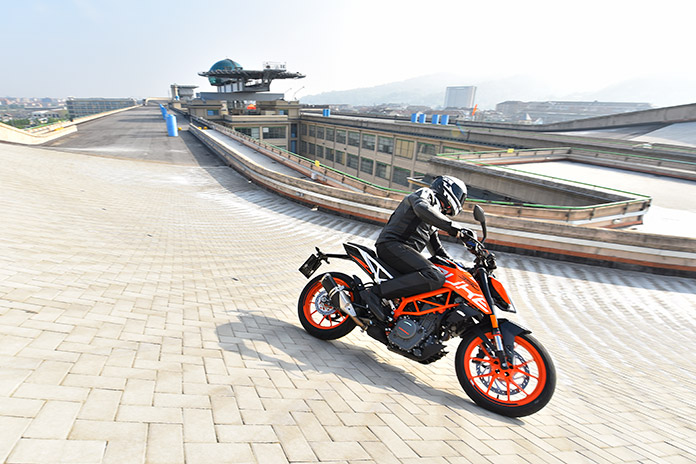
A year later, we got a 390 Duke for a test on our own turf, and I wrangled the keys away from Jenny Smith long enough to give it a proper thrash.
This time around, it was a cold, clear day in Almeria, Spain, when our multinational group of journalists hopped on a fleet of shiny new 390 Dukes. I chose one in KTM orange, with the bright color found not only on the tank and sharply angled bodywork but also on the seat, frame, and wheels. When I turned on the key, the instrument panel welcomed me with a “30 Years of Duke” animation that’s exclusive to 2024 models. Although the seat is a tad lower, the 390 Duke doesn’t feel dainty or undersized but rather slender and compact.
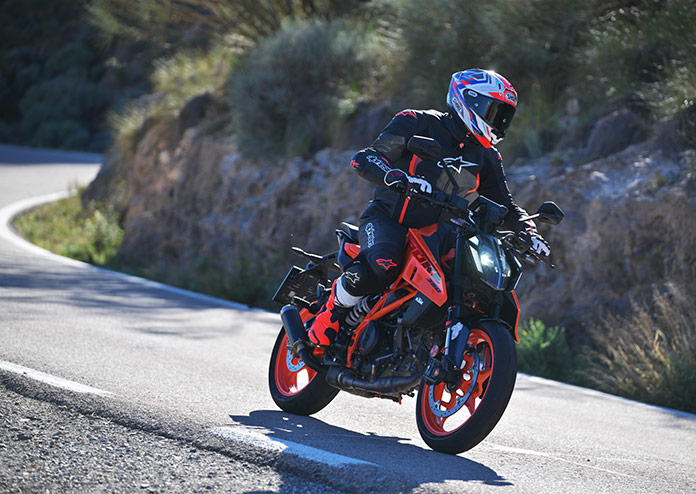
Gear Up
- Helmet: Shoei X-Fifteen
- Suit: Alpinestars Missile V2
- Airbag Vest: Alpinestars Tech-Air 5
- Gloves: Alpinestars SP-8 V3 Air
- Boots: Alpinestars Supertech R Vented
The 390 Duke is an eager beaver, a fiesty machine that begs to be flogged. Its 399cc Single fires up quickly and settles into a mellow burble at idle, but the ’lil Duke really comes alive when its throttle is twisted WFO. With peak horsepower at 8,500 rpm, peak torque at 7,000 rpm, and a 10,000-rpm redline, it pays to keep the engine spinning. Let the revs drop too much, and it can be hard to regain momentum on a twisty road. Though counterbalanced, the engine gets buzzy at high revs.
And believe you me, Spain has more than its fair share of muy twisty roads.
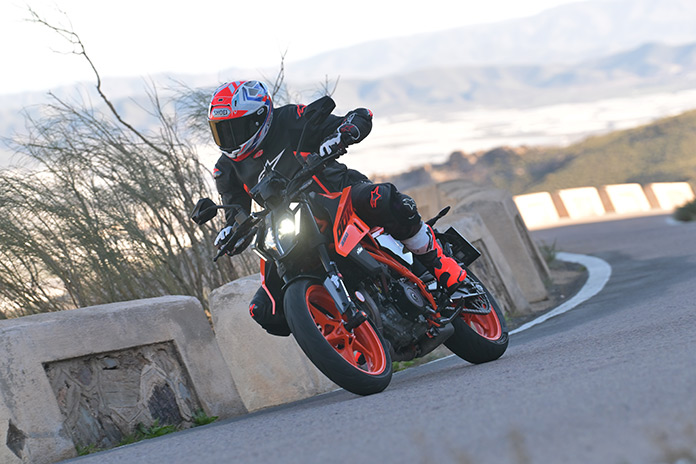
KTM’s nickname for the 390 Duke is “Corner Rocket,” and it lives up to the name. With just 53.4 inches between the axles, sporty steering geometry, and narrow, grippy tires (110/70 front, 150/60 rear), the 390 turns almost as quickly as your brain’s synapses fire off the command to your hands. A lot of shifting is required to stay in the meat of the powerband, and the 6-speed gearbox with slip/assist clutch does the rider’s bidding with minimal effort. The bikes we were riding had the optional Quickshifter+ installed, allowing us to bang our way up and down through the gears without the clutch.
The new Apex suspension did a good job of soaking up bumps as well as the chassis gyrations of being constantly on and off the gas. Since my 200-plus pounds is above average, I used the hook spanner under the seat to ratchet up the rear preload a few clicks. Likewise, the brakes capably slowed the bike and its oversized cargo, and the adjustable hand levers were appreciated.
After a 75-mile hair-on-fire street ride, we returned to the hotel, where KTM had set up a gymkhana course in the parking lot. Pairs of riders went head-to-head on an out-and-back slalom course, with bragging rights going to the fastest time. I’m not a racer, so even though I beat the other rider, I didn’t bother to ask my time. The fastest journalist was a guy from Australia who sliced and diced the course in 34 seconds. Jeremy McWilliams, the former MotoGP racer, current King Of The Baggers racer for Indian, and development rider for KTM, beat all comers with a 32-second time – while wearing jeans and tennis shoes. Check out his Instagram page to see a photo of him losing the front, which he saved on his way to victory.
Upgrades like ride modes, cornering traction control, and adjustable suspension have pushed the 390 Duke’s price up to $6,299, but it’s still a reasonably priced bike that’s more fun than ever. And it’s certainly worthy of the Duke’s 30-year legacy.
Check out more new bikes in Rider’s 2024 Motorcycle Buyers Guide
2024 KTM 390 Duke Specifications
- Base Price: $6,299
- Website: KTM.com
- Warranty: 2 yrs., 24,000 miles
- Engine Type: Liquid-cooled, transverse Single, DOHC w/ 4 valves
- Displacement: 399cc
- Bore x Stroke: 89.0 x 64.0mm
- Horsepower: 45 hp @ 8,500 rpm (factory claim)
- Torque: 28.8 lb-ft @ 7,000 rpm (factory claim)
- Transmission: 6-speed, cable-actuated slip/assist wet clutch
- Final Drive: Chain
- Wheelbase: 53.4 in.
- Rake/Trail: 24 degrees/3.7 in.
- Seat Height: 32.3 in.
- Wet Weight: 364 lb
- Fuel Capacity: 4.0 gal.
- Fuel Consumption: 69 mpg (factory claim)
The post 2024 KTM 390 Duke Review | First Ride appeared first on Rider Magazine.
Source: RiderMagazine.com

